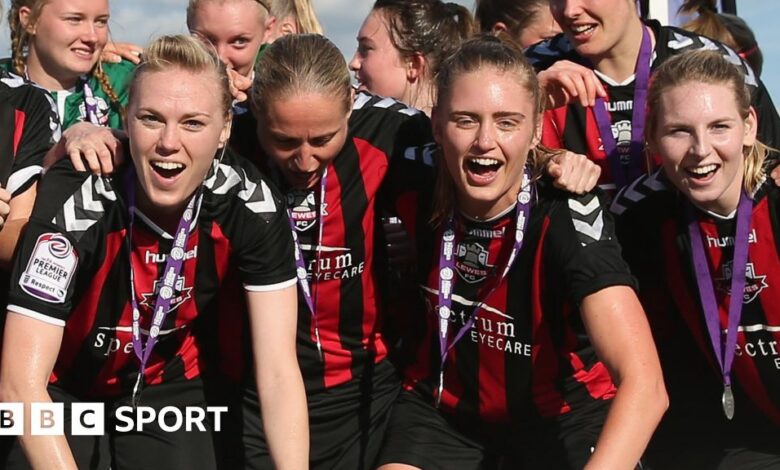Lewes FC: The football club with same budget for men’s & women’s teams

“Some people said: ‘If you do this, people are going to turn away from you.'”
Lewes FC is a 100% fan-owned club, with all owners paying £30 a season to have a say in how the club is run.
The stance on equality was not universally accepted, and Dobres says that “there are some people on the terraces watching men’s football who don’t agree with it”.
However, he adds: “Attendances at men’s games are already up by 20-25% on last season.
“The women are starting from a low base, but last season we doubled attendances. We got a gate of nearly 1,000 for a women’s game when we played Everton in the FA Cup. That clearly demonstrates what’s available.”
Introducing pay parity has drawn a new demographic of fans to the club, such as Dobres’ wife Karen, who had never been to watch football until she heard about their commitment to equality. She is now volunteer press officer for the team.
“I’d always thought of football as a men’s game and something that was a drone on the TV in the background,” Karen Dobres said.
“I came to a match and I really enjoyed seeing the women playing football. It was like a breath of fresh air because I was thinking of my daughter and thought what fantastic role models they are.”
She does not watch the men’s team, saying she cannot “relate in the same way”, but says watching the women makes her feel “stronger in herself”.
“It’s the centenary of suffrage so there’s been a lot of awareness in the public about the inequality of the sexes, and I was thinking about the #metoo campaign and the #timesup campaign and quite often you see all this in the media and you feel powerless,” she added.
“But there is something we can do – because we can support what Lewes are pioneering here.”
The biggest argument against equal pay in football is that women’s football doesn’t generate the same revenue, but Charlie Dobres points to the time it was banned by the FA as a reason for that.
Between 1921 and 1971 women were not allowed to play on FA affiliated pitches.
“In the year it was banned, even though the men’s football had already been re-established in the league for two or three years [after the war], more people watched women’s football,” said Charlie Dobres.
“The men’s game has a bit of a lead – but give it a bit more time and I think the women’s game will catch up.
“More importantly, shouldn’t everyone want it to?”
Source link




